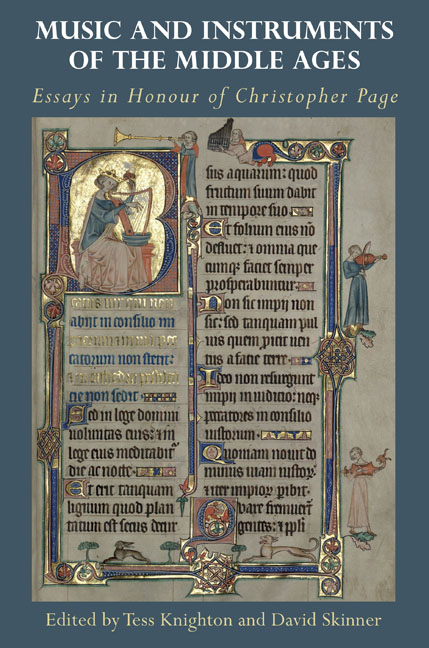Book contents
- Frontmatter
- Contents
- List of Illustrations
- List of Music Examples
- List of Tables
- List of Contributors
- List of Music Manuscript Sigla
- Acknowledgements
- Introduction
- SONGSTERS AND THEIR REPERTORIES
- CLOSE READINGS
- CREATING POLYPHONY
- MUSIC AS CULTURAL PRACTICE
- Works Cited
- Works by Christopher Page
- Index
- Tabula Gratulatoria
- Studies in Medieval and Renaissance Music
9 - Super omnes speciosa: Machaut Reading Vitry
Published online by Cambridge University Press: 24 November 2020
- Frontmatter
- Contents
- List of Illustrations
- List of Music Examples
- List of Tables
- List of Contributors
- List of Music Manuscript Sigla
- Acknowledgements
- Introduction
- SONGSTERS AND THEIR REPERTORIES
- CLOSE READINGS
- CREATING POLYPHONY
- MUSIC AS CULTURAL PRACTICE
- Works Cited
- Works by Christopher Page
- Index
- Tabula Gratulatoria
- Studies in Medieval and Renaissance Music
Summary
I will never forget the day a student burst into laughter when I played a fourteenthcentury motet in class. It was not Gothic Voices, but it could have been, because to this undergraduate piano performance major the sound of the motet was ridiculously strange. Built from the bottom up (though that statement is a gross generalisation), often with multiple simultaneous texts, medieval motets do not reflect the top-down approach we normally use to listen to music of more recent times. Moreover, at least in their late medieval French incarnation, these motets often engage in intertextual dialogue with the bible and liturgy, with vernacular literature, with historical events, and with each other. It is hard not to see them as puzzles of sorts; products of a kind of insider group that may seem to be more interested in the kinds of inaudible harmonies described by Boethius than in pleasing the ears of listeners – in their time or ours.
Christopher Page warned us about excessive focus on the motet as intellectual puzzle removed from sound in Discarding Images. I was in graduate school when that book came out, working with Margaret Bent, and both the book and her critical response to it influenced me as I moved through the dissertation on to a career at a university where my fundamental role was teaching undergraduates – not future musicologists, but students in music therapy, jazz studies, and other fields for whom medieval motets are an object of bewilderment if not derision. I have come to use the very strangeness of fourteenth-century motets as a way to challenge my students to consider what these pieces can tell us about the late medieval world, and I hope my efforts at getting my students to understand ‘the “otherness” of the Middle Ages’ is accomplished with the respect Chris charges us to bring to the task.
Of course, another way Chris has influenced me and many others is through his recordings with Gothic Voices. There he brought motets to life in real time, further reminding us that, even if these motets have all those inaudible harmonies (and I still believe they do), they also exist as sound, and surely in both their own time and ours that sound is the primary experience for many people. The following is offered in gratitude for those recordings and the ways he has challenged our field for the better.
- Type
- Chapter
- Information
- Music and Instruments of the Middle AgesEssays in Honour of Christopher Page, pp. 247 - 270Publisher: Boydell & BrewerPrint publication year: 2020

